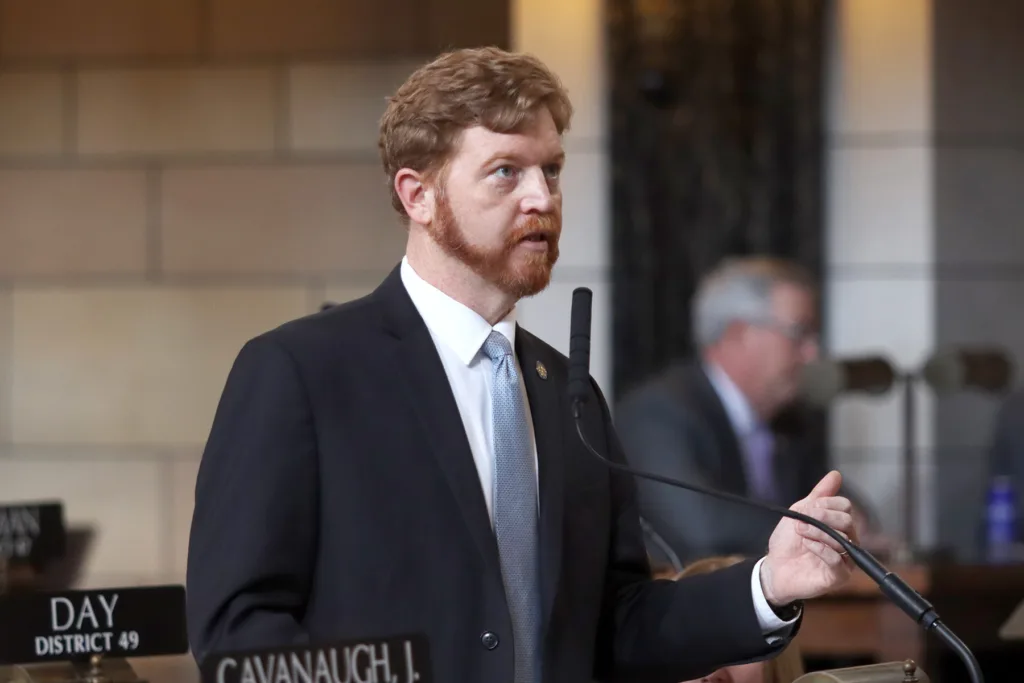Editor’s note: LB233 passed on final reading Thursday, April 11 on a 46-0 vote. It must be signed by Gov. Jim Pillen before becoming law.
Katie Nungesser had stretched her monthly welfare check to its limit. The $281 paid for her cell phone bill, infant daughter’s diapers and car insurance, but she couldn’t afford enough gas to drive nearly five hours for her kid’s weekend visit with her ex-husband.
How could she not have enough money when he was paying child support, her ex-husband asked.
“Wait,” Nungesser remembers thinking, “what child support?”
To get her welfare benefits, Nungesser had signed over her right to receive full child support. What she didn’t know was the state was keeping it – a common problem for Nebraska’s poorest people and an issue she hopes a bill moving through the Nebraska Legislature will fix.
On Tuesday that bill, LB233, passed its second reading 32-0 after surviving a brief challenge in the final days of the session. It needs one more vote before the session ends on April 18 and the governor’s signature to become law.
“These are just nickels and dimes to the state,” Nungesser, now a policy coordinator at Voices for Children, said of the child support collections. “But making this change is really substantial for the families that are in these crisis levels.”

Over the last decade the state has collected $15.7 million in child support due to people in its welfare system, called Aid to Dependent Children. It sent about half that to the federal government and funneled the remainder into state programs.
LB233, introduced by State Sen. John Cavanaugh, an Omaha Democrat, would give more of that money back to families.
Right now, a single parent who qualifies for Aid to Dependent Children assistance is eligible to receive a maximum of $464 a month if they have one child. But then they don’t get some or all of their owed child support money.
That money, an average of $240 per month, can significantly affect these family’s budgets, said Diane Amdor, Nebraska Appleseed’s economic justice program staff attorney.
“That is a game changer,” she said. “It’s like, ‘Do we get to eat the things that we want to eat? Or are we living on saltines for the rest of the month?’”
Originally the bill would have passed all child support to these families – but that change would have cost the state $1 million annually, according to a fiscal note.
In early April, Cavanaugh, representatives from the Department of Health and Human Services and members of Gov. Jim Pillen’s policy research team agreed to amend the bill. The changes capped how much monthly child support the state could pass on to parents enrolled in Aid to Dependent Children at $100 for one child and $200 for two or more children. This deal ensures Nebraska won’t have to reimburse the federal government its share of the collections, said Pillen spokesperson Laura Strimple.
And it made it far more unlikely that state senators would vote against it, since it now is estimated to cost the state less than $200,000 annually.
“I’m shocked we’d have a program that would chase around people that are not in good financial shape because it saves the state $195,000 a year,” said Sen. Lou Ann Linehan, a Republican from the Omaha area.

Linehan and Sen. Steve Erdman, a Republican who represents nine counties in the Nebraska Panhandle, previously filed motions to postpone the bill. They withdrew the motions on Tuesday.
To implement the policy by July 2027, the state will have to update the computer system it uses to enforce child support, which the bill’s fiscal note estimates will cost $4.3 million. Amdor said similar updates in states like Washington and Colorado have cost less than $1 million.
If the bill passes, Nebraska would join 28 states that have so-called “pass through and disregard” laws, according to a May 2023 list from the National Conference of State Legislatures.
Diana Azevedo-McCaffrey, a policy analyst with the Washington, D.C.-based Center on Budget and Policy Priorities, said the practice is becoming more common nationally as caseloads for benefit programs decline and states derive less revenue from child support payments. Last year Nebraska collected about half the child support from Aid to Dependent Children recipients as it had a decade earlier.
Cavanaugh said this bill is a common sense solution.
The Nebraskans helped by this switch would be among the state’s poorest families. To qualify for ADC assistance in Nebraska, a family with one child can’t earn more than $843 per month. Income limits increase with additional children.
Many things about Nebraska’s welfare system are hard to understand, Cavanaugh said. This is not one of them.
“This is about getting money to kids,” he said.

Speaker John Arch, a Republican from Papillion, set it as one of his speaker priority bills after years of discussing unspent funds from Temporary Assistance for Needy Families (TANF), the federal grant that pays for Nebraska’s benefits program.
Today, less than half as many Nebraskans receive welfare benefits as did in 2000. From 2012 to 2022 the state also saw a 25% decrease in the amount it spent on basic assistance, according to federal data. Those trends have contributed to the state’s fund of unspent TANF money swelling to more than $125 million. Cavanaugh’s bill would likely increase enrollment in the program, Amdor said.
“LB 233 advanced from the Health committee on a unanimous vote and I think it is time for the Legislature, as the state’s duly elected deliberative body, to be a part of this discussion,” Arch wrote in a statement.
The practice of retaining child support is a federal requirement rooted in the welfare reform of the ‘90s and is designed to pay back a portion of welfare programs.
Jeff Powell, a DHHS spokesperson, said the state uses its portion of the child support collections to fund other programs like a nutrition assistance program, a home energy assistance program and a child care subsidy. However, more than half of the collected money goes to the federal government.
The federal government does allow states to circumvent that requirement, but states are then on the hook for finding new funding for these other programs. The state also has to reimburse the federal government if monthly child support payments exceed $100 for one child or $200 for two or more children.
In 2015, Colorado passed the first law that passes through all child support for welfare recipients. That policy cost the state $5.2 million last year, according to the state’s budget. Larry Desbien, the state’s Child Support Services director, said that allocation shows a commitment to a program that’s getting good results.
State research found Colorado parents received about $167 more for their kids and more parents paid child support. Desbien said he takes any opportunity he can to tell other states’ child support program directors about the benefits of the policy change.
“There is a wave going on across the country of states that have either implemented this or are looking at doing so,” he said. “So no, (my department has) never had any hesitation, or any thought, that this was the wrong policy change.”
Nungesser hopes Nebraska’s bill starts a more broad discussion about funding for needy families in the Legislature. She said the last few years have brought more attention to it, in part because of the growth in unspent TANF funds.
State Sens. Machaela Cavanaugh, of Omaha, and Danielle Conrad, of Lincoln, both Democrats, have introduced bills to increase eligibility and benefit levels. Conrad also sponsored a legislative study on TANF spending last year and plans to introduce another study after this year’s session.
“Hopefully, we can keep this momentum going,” Nungesser said. “And I think that these conversations open up the conversations on cash assistance in general.”


